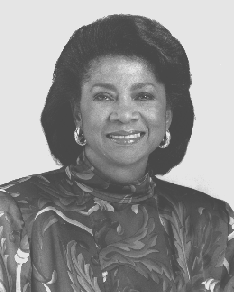Page 37
[Begin Tape 1, Side A]
Biagi: Let's start talking a little bit about Channel 5 [KPIX] and the women's angle here.
Davis: When I arrived, Nancy Reynolds, of course, was an anchor, so she was the sidekick to John Westin, who was the original unknowing sexist of all sexists. [Laughter.] He was not an evil person by any means. It's just that he was a product of his era and of the environment that was the prevalent one then. Women had these special little corners in which they lived, in the news business, anyway.
Wanda Ramey co-anchored the midday. It was mostly a women's audience, so it was very natural to do garden shows, the softer side of the news. It was not anything to be ashamed of. Our consciousness had not been raised to the fact that there was anything wrong with that, and I'm sure that women who did women's news made a tremendous contribution. I was a women's editor of my newspaper, and I didn't see anything wrong with it. It was my corner, and I was proud to own it. But later on, as we began to see and discuss more, coming out of the civil rights movement, equity, women's eyes began to open and they wanted a little bit more.
So now I start in a job in an office where there are only four full-time reporters. So what do you do if you're going to have only four full-time reporters and one of them is a woman? You say they're going to do everything. So I think I probably suffered from the trial by fire to see how much I could take, how far I could go. I do remember my very good friend now, but in those days, my buddy who's really a cops-and-robbers guy, Lou Calderon, was one of the first cameramen I worked with, and it was Lou's job to see what my breakpoint was going to be.
Biagi: Does he really admit that?
Davis: Now he does, yes, but then it was just fun and games. Everybody was in on it. There was nothing wrong with it that they could see. The thing was to see how I would hold up when I saw my first body, how I'd hold up when I saw the first blood on the street.
Biagi: How did you react when you saw your first body?
Davis: He will never know. [Laughter.] I still remember it today, I can tell you that, and I also still remember my first hot chase with bullets flying, and it all happened within the first two weeks of my employment at KPIX. There was a robbery, and there was a hot chase with the cops, and we were in the car tearing at such tremendous speeds, and we had terrible cars in those days because KPIX has always been pretty tight with a buck. So we're chasing and they're firing at the police, and somehow we got between them and the cops. For Lou, this was fun and games. He's on a two-way talking to the office. This is big stuff. He can let the guys in the office know what danger we're in. So he's speeding along, talking on the two-way, driving with one hand. I was working with Fred Zender then. Fred's on the desk. Then they say to Lou, is there any way he can get his Bell & Howell out and shoot. He says, "Well, I could let Belva hold the steering wheel

